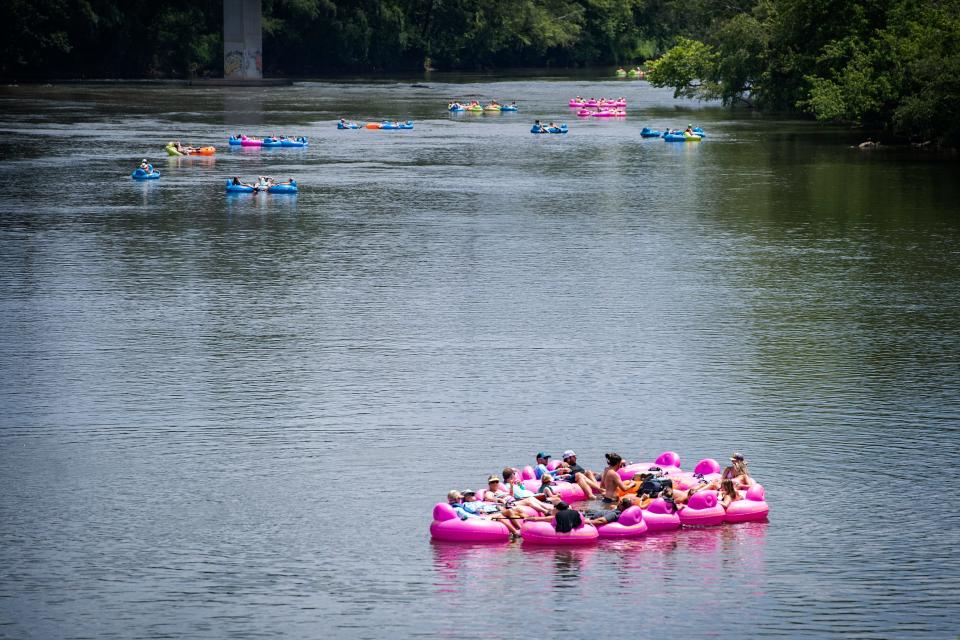Before tubing the French Broad River in Asheville, find out how much E.coli is in water
ASHEVILLE — Blistering heat already descending upon the mountains this June is beckoning many to raft, paddleboard, swim and kayak the French Broad River. But how safe is the river that flows through the heart of Asheville?
When it comes to E.coli levels, it depends on the week.
Every Wednesday, staff from the Western North Carolina conservation group MountainTrue test the French Broad and its tributaries for the bacteria E.coli. On Fridays, the group publishes the results on the website and app Swim Guide.

E.Coli levels are measured against standards set by the federal Environmental Protection Agency. When E.coli levels fall within federal standards, it means a person can safely submerge themselves in the river. Anything above the standard level of 235 E.coli cfu/100 millitters means it’s best to avoid putting your head underwater.
Heat record: Asheville breaks heat record June 13. NWS says more record heat could come
$3.8 billion:French Broad River has mighty economic impact in WNC, new study says
E.coli comes from fecal matter, produced by farms, wild and domestic animals and humans. In April 2021, MountainTrue DNA tested the river and found “that cattle and faulty or inadequate sewer, septic or water treatment infrastructure are the major sources of E. coli pollution in the French Broad River.”
The report noted that after years of steady improvement to the river’s water quality, E.coli levels had shot up.

Looking like chocolate milk
Greater development and industrial activity has brought more E.coli into the river, said Karim Olaechea, communications director for MountainTrue.
Major storms also cause runoff that makes E.coli levels jump. If a storm hits the area on a Thursday, the day between MountainTrue's water testing and when it publishes its results, Olaechea recommended people use their eyes to determine if the water’s safe.
“There's a big correlation between muddiness, the turbidity of the water, and its safety,” he said. “So, if the water looks like chocolate milk, you know there's a pretty good chance there's a ton of runoff coming in from broken septic systems and agriculture and stuff like that.”
More: NC Answers: Is tap water safe to drink in North Carolina?
Western North Carolina: Are giant muskie returning to the French Broad? They've been absent from its natural flow
MountainTrue tests 41 locations on the French Broad and its tributaries, publishing each result on Swim Guide, which measures the safety of water sources across the globe. For the week starting June 8, the French Broad River at the River Arts District received a green mark, meaning its E.coli levels were safe. This upcoming week’s results will be published June 17.
So far in 2022, the French Broad River has earned mixed safety ratings. At the popular River Arts District location, the river water has been deemed safe for submerging half the weeks.

Olaechea said some people who recreate on the river when E.coli levels are elevated report stomach infections, skin rashes, or their dogs becoming sick. The biggest risk is ingesting, but people are recommended to wash their hands and bodies after coming into contact with the river.
'I don't want to make it apocalyptic'
Anna Alsobrook, the watershed outreach coordinator at MountainTrue, said she would still be comfortable kayaking or rafting on the river when E.coli levels were high.
“I don't want to make it apocalyptic,” she said. “There is inherent risk for sure. I’m probably going to get in the river, personally, and with my dog, but somebody else might not.”
Asheville: On Amboy Road, Asheville Adventure Company plans music venue, outdoor hub
NC answers:What happens to the stuff we put in our recycling bins?
Overall, MountainTrue tests water at 85 locations throughout Western North Carolina, Northern Georgia, and Eastern Tennessee. In addition to E.coli, the group also tests the river for pH levels, dissolved oxygen and sometimes DNA.
June is the start of the busiest season for recreational use of the French Broad says Tom Huml, who works at Wai Mauna SUP Tours and Paddleboard Rentals in Asheville. But he said this year’s summer rush has been tempered by rising gas prices discouraging some tourists from traveling to Western North Carolina.
“Most of our customers are tourists,” Huml said. “They might want to be staying closer to home.”
Brian Gordon is a statewide reporter with the USA Today Network in North Carolina. Feel free to email him at bgordon@gannett.com or follow him on Twitter @skyoutbriout
This article originally appeared on Asheville Citizen Times: Asheville: French Broad River E.coli levels tested

